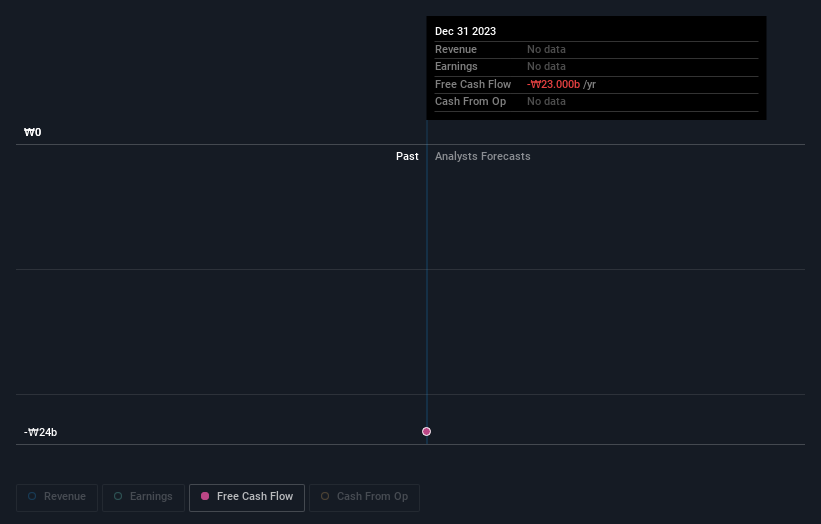- South Korea
- /
- Semiconductors
- /
- KOSDAQ:A396270
Nextchip Co., Ltd.'s (KOSDAQ:396270) biggest owners are individual investors who got richer after stock soared 12% last week

Key Insights
- Significant control over Nextchip by individual investors implies that the general public has more power to influence management and governance-related decisions
- The top 16 shareholders own 50% of the company
- Past performance of a company along with ownership data serve to give a strong idea about prospects for a business
A look at the shareholders of Nextchip Co., Ltd. (KOSDAQ:396270) can tell us which group is most powerful. The group holding the most number of shares in the company, around 50% to be precise, is individual investors. Put another way, the group faces the maximum upside potential (or downside risk).
As a result, individual investors were the biggest beneficiaries of last week’s 12% gain.
In the chart below, we zoom in on the different ownership groups of Nextchip.
View our latest analysis for Nextchip

What Does The Institutional Ownership Tell Us About Nextchip?
Institutional investors commonly compare their own returns to the returns of a commonly followed index. So they generally do consider buying larger companies that are included in the relevant benchmark index.
As you can see, institutional investors have a fair amount of stake in Nextchip. This can indicate that the company has a certain degree of credibility in the investment community. However, it is best to be wary of relying on the supposed validation that comes with institutional investors. They too, get it wrong sometimes. If multiple institutions change their view on a stock at the same time, you could see the share price drop fast. It's therefore worth looking at Nextchip's earnings history below. Of course, the future is what really matters.

Nextchip is not owned by hedge funds. NC& Co.,Ltd is currently the largest shareholder, with 43% of shares outstanding. In comparison, the second and third largest shareholders hold about 4.9% and 0.5% of the stock.
A deeper look at our ownership data shows that the top 16 shareholders collectively hold less than half of the register, suggesting a large group of small holders where no single shareholder has a majority.
While it makes sense to study institutional ownership data for a company, it also makes sense to study analyst sentiments to know which way the wind is blowing. While there is some analyst coverage, the company is probably not widely covered. So it could gain more attention, down the track.
Insider Ownership Of Nextchip
The definition of company insiders can be subjective and does vary between jurisdictions. Our data reflects individual insiders, capturing board members at the very least. Company management run the business, but the CEO will answer to the board, even if he or she is a member of it.
Insider ownership is positive when it signals leadership are thinking like the true owners of the company. However, high insider ownership can also give immense power to a small group within the company. This can be negative in some circumstances.
Our data suggests that insiders own under 1% of Nextchip Co., Ltd. in their own names. It has a market capitalization of just ₩231b, and the board has only ₩1.9b worth of shares in their own names. We generally like to see a board more invested. However it might be worth checking if those insiders have been buying.
General Public Ownership
The general public, who are usually individual investors, hold a substantial 50% stake in Nextchip, suggesting it is a fairly popular stock. This level of ownership gives investors from the wider public some power to sway key policy decisions such as board composition, executive compensation, and the dividend payout ratio.
Public Company Ownership
We can see that public companies hold 43% of the Nextchip shares on issue. We can't be certain but it is quite possible this is a strategic stake. The businesses may be similar, or work together.
Next Steps:
I find it very interesting to look at who exactly owns a company. But to truly gain insight, we need to consider other information, too. For instance, we've identified 2 warning signs for Nextchip (1 doesn't sit too well with us) that you should be aware of.
But ultimately it is the future, not the past, that will determine how well the owners of this business will do. Therefore we think it advisable to take a look at this free report showing whether analysts are predicting a brighter future.
NB: Figures in this article are calculated using data from the last twelve months, which refer to the 12-month period ending on the last date of the month the financial statement is dated. This may not be consistent with full year annual report figures.
Valuation is complex, but we're here to simplify it.
Discover if Nextchip might be undervalued or overvalued with our detailed analysis, featuring fair value estimates, potential risks, dividends, insider trades, and its financial condition.
Access Free AnalysisHave feedback on this article? Concerned about the content? Get in touch with us directly. Alternatively, email editorial-team (at) simplywallst.com.
This article by Simply Wall St is general in nature. We provide commentary based on historical data and analyst forecasts only using an unbiased methodology and our articles are not intended to be financial advice. It does not constitute a recommendation to buy or sell any stock, and does not take account of your objectives, or your financial situation. We aim to bring you long-term focused analysis driven by fundamental data. Note that our analysis may not factor in the latest price-sensitive company announcements or qualitative material. Simply Wall St has no position in any stocks mentioned.
About KOSDAQ:A396270
Nextchip
NEXTCHIP Co., Ltd. operates as an automotive vision semiconductor company in South Korea.
Very low with weak fundamentals.
Market Insights
Community Narratives




